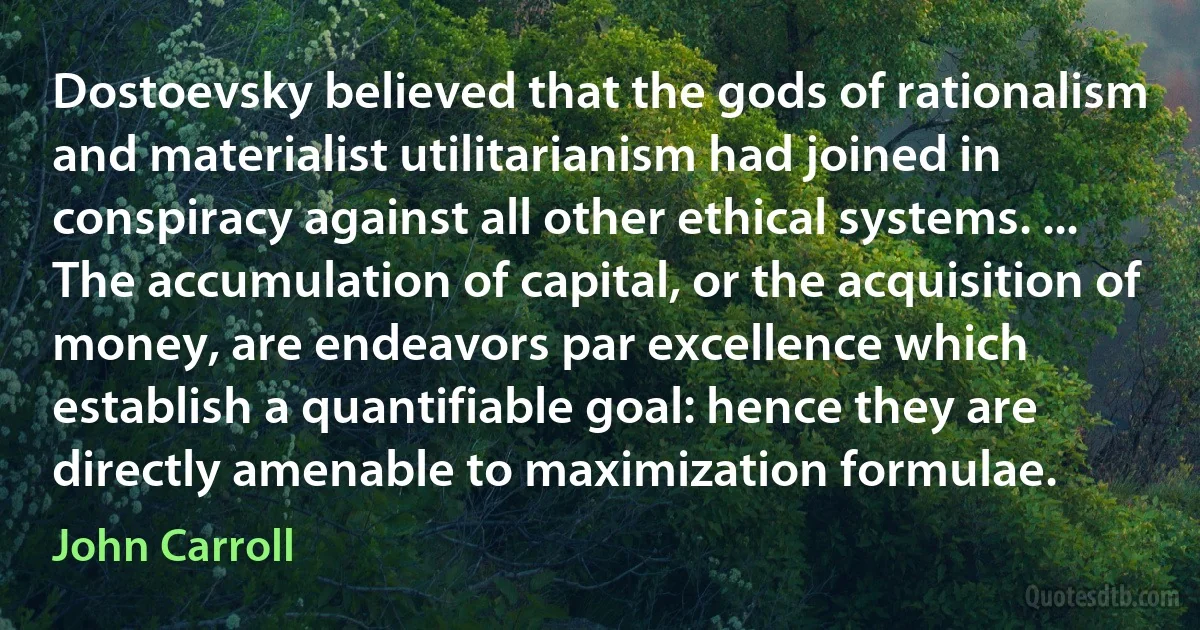Dostoevsky Quotes
It seems to me that had I not known Dostoevsky or Nietzsche or Freud or X or Z, I should have thought just as I did, and that I found in them rather an authorization than an awakening. Above all, they taught me to cease doubting, to cease fearing my thoughts, and to let those thoughts lead me to those lands that were not uninhabitable because after all I found them already there.

André Gide
I doubt whether the Revolution has, in essentials, changed Russia at all. Reading Gogol, or Dostoevsky for that matter, one realizes how completely the Soviet regime has fallen back on to, and perhaps invigorated, the old Russia. Certainly there is much more of Gogol and Dostoievsky in the regime than there is of Marx.

Malcolm Muggeridge
If you look at the literature of the 19th century, you get things like Kafka and Dostoevsky, who basically write about feeling bored and alienated. That's because we lost contact with the important things in life like work that you enjoy, or the garden, nature, your family and friends.

Tom Hodgkinson
Goethe as an old man: he was so very punctual. At that time he also wrote many things that were very punctual. The rounded thing is boring. Turn it as you may, it remains round and pretty.
I love the edges, the sharp lines, and fractures.
I show to him a picture of Dostoevsky. How ruptured, furrowed, tormented!
He looks like Michelangelo; the face of an endurer and a prophet.

Joseph Goebbels
The truth that Dostoevsky puts in the mouth of the Grand Inquisitor is that humankind has never sought freedom, and never will. The secular religions of modern times tell us that humans yearn to be free; and it is true that they find restraint of any kind irksome. Yet it is rare that individuals value their freedom more than the comfort that comes with servility, and rarer still for whole peoples to do so.

John N. Gray
You often feel about something in Shakespeare or Dostoevsky that nobody ever said such a thing, but it's just the sort of thing people would say if they could - is more real, in some sense, than what people do say. If you have given your imagination free rein, let things go as far as they want to go, the world they made for themselves while you watched can have, for you and later watchers, a spontaneous finality.

Randall Jarrell
Our sensuous appreciation of the world and of the works created by man has, no doubt, a biological foundation, one shared by all human beings, but that is no use to us when we try to evaluate a Bach fugue or a Dostoevsky novel-or even the simple experience of a landscape, as our delight in the view of a mountain or a waterfall is also determined by the traditions of our culture. The coexistence of different criteria of judgment is, in any case, by now a fact of life. Beethoven cannot be judged or even understood by the standards of Mozart, however much he may have continued them, nor Berg by the standards of Wagner or Richard Strauss, nor Elliott Carter by the values of Ives and Stravinsky.

Charles Rosen
You think your pain and your heartbreak are unprecedented in the history of the world, but then you read. It was Dostoevsky and Dickens who taught me that the things that tormented me most were the very things that connected me with all the people who were alive, or who ever had been alive.

James Baldwin
What we need in literature today are vast philosophic horizons - horizons seen from mastheads, from airplanes; we need the most ultimate, the most fearsome, the most fearless "Why?" and "What next?"
This is what children ask. But then children are the boldest philosophers. They enter life naked, not covered by the smallest fig leaf of dogma, absolutes, creeds. This is why every question they ask is so absurdly naive and so frighteningly complex. The new men entering life today are as naked and fearless as children; and they, too, like children, like Schopenhauer, Dostoevsky, Nietzsche, ask "Why?" and "What next?" Philosophers of genius, children, and the people are equally wise - because they ask equally foolish questions. Foolish to a civilized man who has a well-furnished European apartment with an excellent toilet and a well-furnished dogma.

Yevgeny Zamyatin
If I had not existed, someone else would have written me, Hemingway, Dostoevsky, all of us. Proof of that is that there are about three candidates for the authorship of Shakespeare's plays. But what is important is Hamlet and A Midsummer Night's Dream, not who wrote them, but that somebody did. The artist is of no importance. Only what he creates is important, since there is nothing new to be said. Shakespeare, Balzac, Homer have all written about the same things, and if they had lived one thousand or two thousand years longer, the publishers wouldn't have needed anyone since.

William Faulkner



